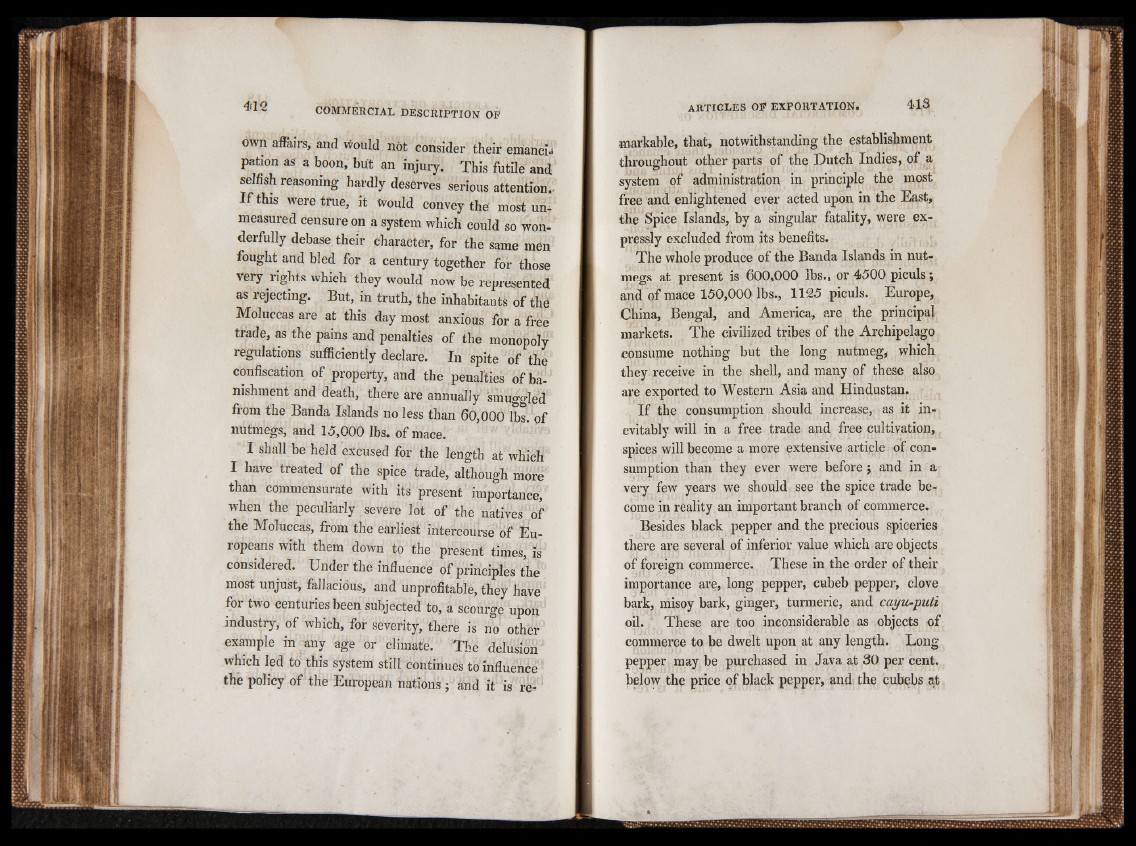
own affairs, and Would not consider their emanci^
pation as a boon, but an injury. This futile and
selfish reasoning hardly deserves serious attention.
If this were true, it would convey the most unmeasured
censure on a system which could so wonderfully
debase their character, for the same men
fought and bled for a century together for those
very rights which they would now be represented
as rejecting. But, in truth, the inhabitants of the
Moluccas are at this day most anxious for a free
trade, as the pains and penalties of the monopoly
regulations sufficiently declare. In spite of the
confiscation of property, and the penalties of banishment
and death, there are annually smuggled
from the Banda Islands no less than 60,000 lbs. of
nutmegs, and 15,000 lbs. of mace.
I shall be held excused for the length at which
I have treated of the spice trade, although more
than commensurate with its present importance,
when the peculiarly severe lot of the natives of
the Moluccas, from the earliest intercourse of Europeans
with them down to the present times, is
considered. Under the influence of principles the
most unjust, fallacious, and unprofitable, they have
for two centuries been subjected to, a scourge upon
industry, of which, for severity, there is no other
example in any age or climate. The delusion
which led to this system still continues to influence
the policy of the European nations ; and it is ffe
markable, that, notwithstanding the establishment
throughout other parts of the Dutch Indies, of a
system of administration in principle the most
free and enlightened ever acted upon in the East,
the Spice Islands, by a singular fatality, were expressly
excluded from its benefits.
The whole produce of the Banda Islands in nutr
megs at present is 600,000 lbs., or 4500 piculs j
and of mace 150,000 lbs., 1125 piculs. Europe,
China, Bengal, and America, are the principal
markets. The civilized tribes of the Archipelago
consume nothing but the long nutmeg, which
they receive in the shell, and many of these also
are exported to Western Asia and Hindustan.
If the consumption should increase, as it inevitably
will in a free trade and free cultivation,
spices will become a more extensive article of consumption
than they ever were before j and in a
very few years we should see the spice trade become
in reality an important branch of commerce.
Besides black pepper and the precious spiceries
there are several of inferior value which are objects
of foreign commerce. These in the order of their
importance are, long pepper, cubeb pepper, clove
bark, misoy bark, ginger, turmeric, and cayu-puti
oil. These are too inconsiderable as objects of
commerce to be dwelt upon at any length. Long
pepper may be purchased in Java at 30 per cent,
below the price of black pepper, and the cubebs at